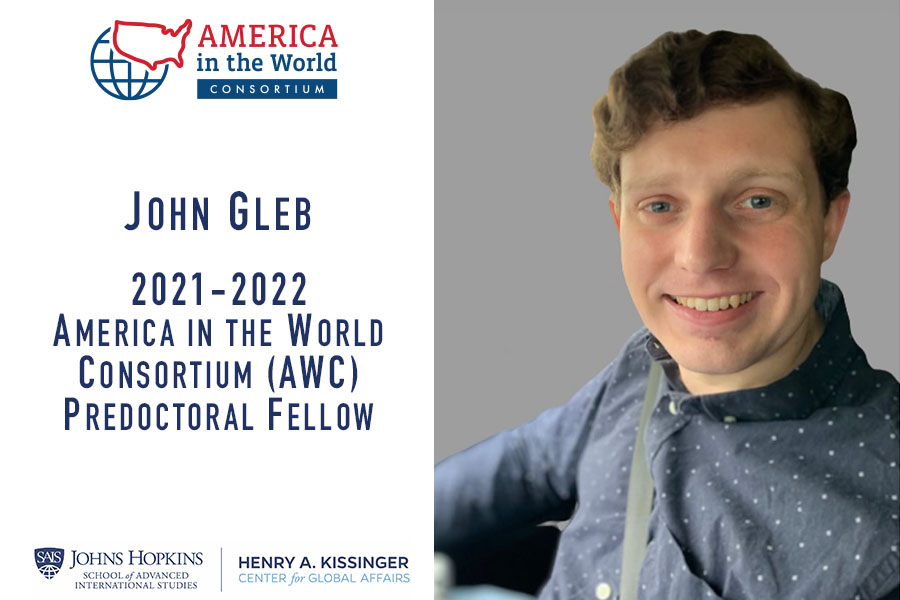Featured Scholar: John Gleb, 2021-2022 AWC Predoctoral Fellow

In this Featured Scholar article, the Henry A. Kissinger Center for Global Affairs spoke with Mr. John Gleb, a 2021–2022 America in the World Consortium Predoctoral Fellow at the Center, to learn more about his ongoing work on the emergence of the American national security state.
John Gleb is an American in the World Consortium Predoctoral Fellow at the Henry A. Kissinger Center for Global Affairs. He is also a doctoral candidate in the Department of History at the University of Texas at Austin (UT), where he earned his MA in May 2020. John received his BA at the University of California, Berkeley, from which he graduated with High Honors and Highest Distinction in 2017. At UT, he is a Graduate Student Fellow at the Clements Center for National Security and has appeared as a guest on The Slavic Connexion, a podcast affiliated with the Department of Slavic and Eurasian Studies. He is also fluent in French. John’s research focuses on the rise of the American national security state and on the relationship between foreign and domestic politics in the United States. He is especially interested in the concept of political consensus, a yearning for which has decisively shaped the worldview and activities of American foreign policymakers since the turn of the twentieth century. John’s dissertation will examine attempts to forge a foreign policy consensus both inside and outside the halls of government between 1900 and 1950. Thanks to those early consensus-building campaigns, the national security state that emerged during the Cold War would consist of more than just a cluster of institutions: as John will show, it also encompassed (and continues to encompass) a system of shared values and ideas from which those institutions had to draw power in order to compensate for their formal weakness.
How did a national security state emerge in the United States? What were the debates surrounding its creation? Who was allowed to take part in those debates, and how did they influence the relationship between foreign policymaking and the democratic process? These are some of the questions Mr. John Gleb, a 2021–2022 America in the World Consortium Predoctoral Fellow at the Center, is investigating during his time in Washington, DC.
Even before starting his graduate work, Mr. Gleb was “always interested in history.” During his undergraduate studies at the University of California Berkeley, he wrote a thesis on the domestic political influences that shaped British diplomacy before the First World War. He was surprised to find members of the British cabinet and professional diplomats locked in heated arguments about policymaking. Specifically, says Mr. Gleb, they disagreed about “who had the right to have input” on policy decisions. Cabinet officers were subject to domestic political pressures from which professional diplomats thought they were immune—and as a result, the Cabinet sometimes made decisions its own agents abroad found unacceptable.
Mr. Gleb found the tension between these elected officials and the diplomats extremely interesting, and when he was admitted to the University of Texas at Austin as a Ph.D. candidate, he wanted to determine if the same phenomenon was observable in the United States during the early twentieth century. “A wealth of documents and background information suggested a whole project could be written on that topic,” he said. Now examining the emergence of a foreign policy establishment composed of individuals who self-identified as professionals, Mr. Gleb investigates how domestic political considerations shaped the development of the State Department and the armed services, taking an innovative approach. Under the supervision of Professor Jeremi Suri, Mr. Gleb examines the debates among officials surrounding the creation of a uniquely American national security state during the first half of the twentieth century.
What the officials shared, Mr. Gleb observes, was a vision of a decentralized, citizen-based national security system that deferred to elite expertise. Their hope was that instead of having to build a strong, autonomous state, they could instead empower a weak, democratic state by harnessing “the basic resource-gathering and war-fighting powers of ordinary people, who would deploy themselves automatically in deference to the will of enlightened nonpartisan experts.”
At the Kissinger Center, Mr. Gleb is particularly interested in working on policy-relevant scholarship, a core element of the Center’s mission. “The more work I’ve done on my project, the more I think what they were talking about then is an important issue to the people who want to do institutional reform today, not only because it is interesting but also because it highlights dangers of answering [questions of reform] in certain ways,” Mr. Gleb says, noting that a given answer might be “tempting in abstract but lead in very dangerous directions.” Moreover, Mr. Gleb found that the Center’s predoctoral fellowship provides fellows the flexibility and support he needs, allowing him to make significant progress on his work. Mr. Gleb is also a member of the Clements Center for National Security at UT Austin, a partner member of the America in the World Consortium. “They share in this commitment [to policy-relevant scholarship], and they’ve been great—a great community of scholars,” Mr. Gleb says.